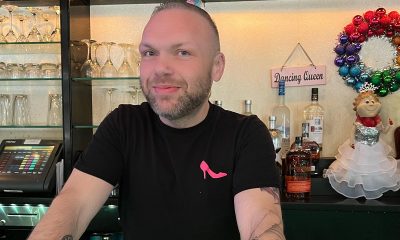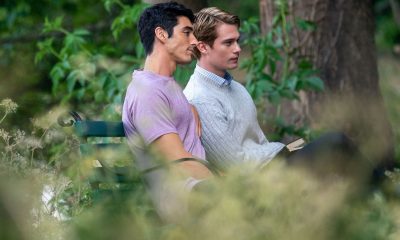Movies
Filmfest D.C. has strong LGBT content again this year
Festival will present 80 films from 45 countries
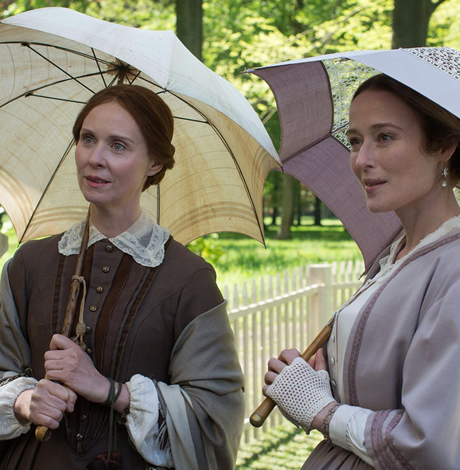
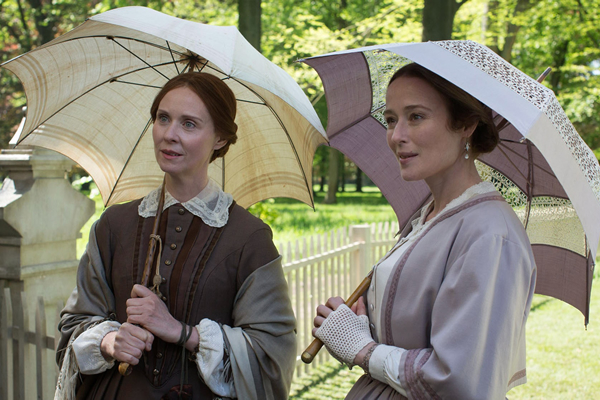
Cynthia Nixon and Jennifer Ehle as Emily and Lavinia Dickinson in ‘A Quiet Passion.’ (Photo courtesy Music Box Films)
Over 11 days from April 20-30, Filmfest D.C. will present 80 films from 45 countries on four screens around the city. According to founder/director Tony Gittens, “as a reflection of our times, this year’s festival has taken on a special focus on issues ripped from today’s headlines in hopes of increasing clarity and civil discourse.”
The festival kicks off with “This Is Our Land,” a political drama by Belgian director Lucas Belvaux. In this timely tale, a self-employed nurse gets embroiled in nationalist politics when she runs for the mayorship of her small town in northern France.
The festival closes with “Lost in Paris,” a charming comedy in the tradition of such great clowns as Jacques Tati, Charlie Chaplin and Buster Keaton. The film stars the husband/wife team of Fiona Gordon and Dominique Abel (who also wrote and directed the movie) as an unlikely duo trying to track down a missing woman (Emmanuelle Riva from “Amour”) in the City of Lights.
“Lost in Paris” will screen at the Embassy of France. For security reasons, all tickets for this screening must be bought in advance online at filmfestdc.org; tickets for all other programs can be purchased online or at the door.
In between these two very different movies are several films that focus specifically on the international LGBT experience. Written and directed by Cuban filmmaker Carlos Lechuga, “Santa & Andres” has already generated significant international controversy. Last December, the film was pulled from the International Festival of New Latin American Cinema in Havana after it was rejected by Cuba’s state-run film institute. Earlier this year, Lechuga pulled the film from the Havana Film Festival New York after the festival organizers shifted the award-winning film from the official competition to a special non-juried presentation.
“Santa & Andres” deals with a contentious topic, the mistreatment of homosexuals and dissidents by the Castro regime. Although the film is fiction, it is inspired by the lives of several gay writers such as Reinaldo Arenas, René Aziza and Delfin Prats. Set in 1983, the film tells the story of Andres, a gay novelist who is under house arrest, and Santa, a local woman who is sent to guard him.
Set on the islands of Trinidad and Tobago during Carnival season, “Play the Devil” is an incisive coming-of-age story about Gregory, a gifted high school student who is caught up in a tumultuous relationship with a wealthy businessman. Written and directed by Bahamian Maria Govan, the film is both a gripping drama and a nuanced exploration of masculinity, privilege and sexuality.
Set right here in Washington, “Check It” is a powerful documentary about a group of LGBT youth who form a gang to protect themselves. They quickly become known as one of the fiercest gangs in the city, but a group of mentors try to steer their fierce sense of style into careers in the fashion industry.
Also set here is “The Messengers” by D.C.-based filmmaker Lucian Perkins. In this moving and thoughtful documentary, Perkins tells the stories of the patients and staff at Joseph’s House, a welcoming hospice for HIV/AIDS patients. A Pulitzer Prize-winning photographer for the Washington Post, this is Perkins’ first full-length documentary.
In “A Quiet Passion,” maverick queer auteur Terence Davies, known for his gritty European dramas, turns his lens on a very different locale: the Dickinson household in 19th century Amherst, Mass. Cynthia Nixon (best known for playing Miranda in “Sex and the City”) gives a powerhouse performance as reclusive poet Emily Dickinson.
Some of the other festival highlights include “Family Life,” a Chilean comedy about the romantic and domestic misadventures of an untrustworthy house (and cat) sitter; “Footnotes,” a retro French musical set in a luxury show factory; “The Hippopotamus,” a wry English comedy based on the novel by openly gay author Stephen Fry; “Lipstick Under My Burkha,” a feminist satire on gender relations in India that has been banned by that country’s Central Board of Film Certification; and “The Stuff of Dreams,” a fanciful retelling of Shakespeare’s “The Tempest.”
There are also three programs of shorts. Short Cuts 1 and 2 focus on international themes. Lunafest shines a spotlight on short films by, for and about women.
Movies
Infectious ‘Egghead & Twinkie’ celebrates love and allyship
Lesbian teen takes journey to self-acceptance with straight BFF
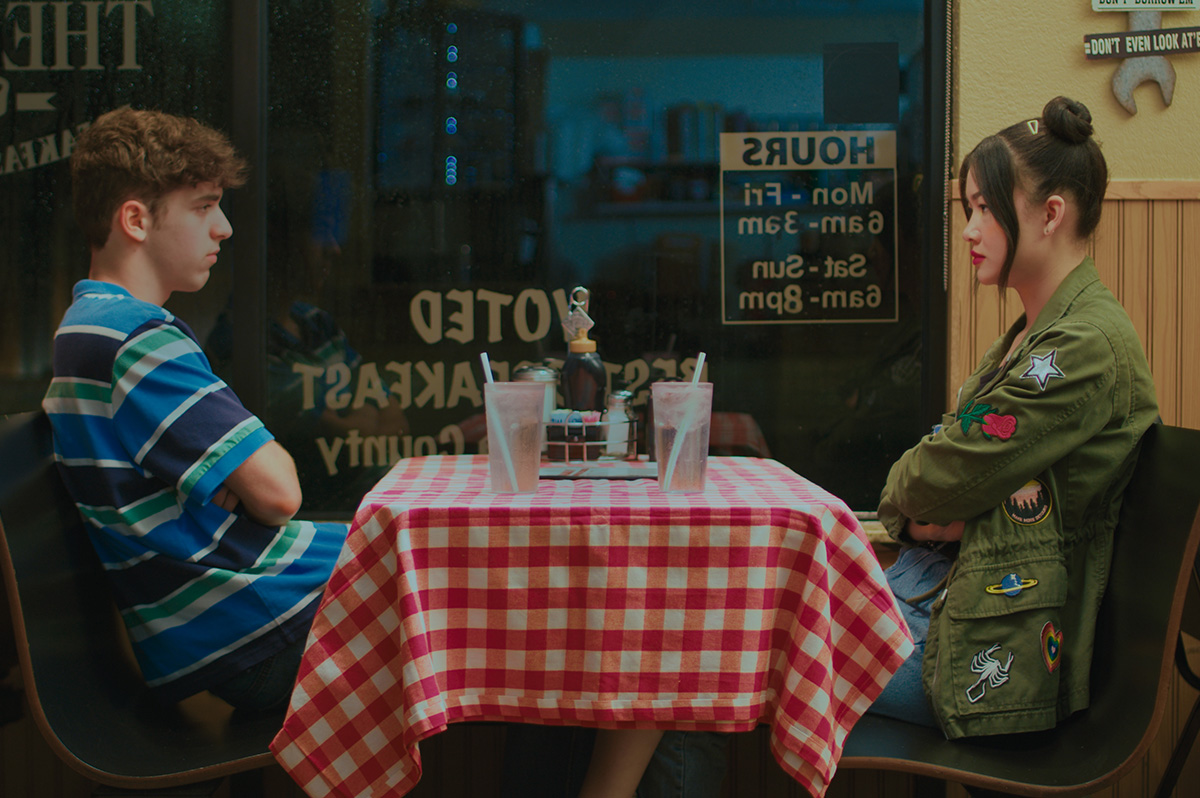
If you’ve ever wondered why so many queer movies are are coming-of-age stories, it might be that you were lucky enough to go through the transition into young adulthood without having to worry about your sexual alignment or gender identity being acceptable to your family or your friends or the world at large – and if that’s the case, we are truly happy for you. That’s the way it should be for everyone.
Unfortunately, it’s not. For many millions of queer kids, growing up is still an experience fraught with fear, shame, and very real peril, and this was true even before the current era of government-sanctioned homophobia and bigotry. It’s never been easy to become who you are when you’re surrounded by a family or community that refuses to accept who you are. It’s as near a “universal” queer experience as one can imagine in a demographic as diverse as ours, and it reinvents itself with each new generation – so there will always be an appeal for queer audiences in stories which express that often painful odyssey in a way that makes us feel “seen.”
That’s why “Egghead & Twinkie” – a 2023 film fest fave only now getting a VOD release (on April 29) – is such a welcome and refreshing addition to the genre. A passion project from Asian American filmmaker Sarah Kambe Holland, who expanded it into a feature from a “proof-of-concept” short she made in 2019, it brings a Gen Z perspective, which makes it as unique and contemporary as it is recognizable and relatable.
Set in suburban Florida, Holland’s movie centers on the relationship of its two title characters. “Egghead” (Louis Tomeo) and “Twinkie” (Sabrina Jie-A-Fa), childhood friends with a deep bond from growing up across the street from each other, face a crossroads as the cute-but-nerdy Egghead prepares to depart for college, leaving behind Twinkie – an Asian-American adoptee raised by socially conservative white parents who is one year his junior – just as she is beginning to come to terms with her long-hidden lesbian identity. Planning to connect with her social media crush (Ayden Lee) at a nightclub event in Texas, she enlists Egghead to accompany her as she “runs away” from her restrictive parents into the arms of a girlfriend she has never actually met in person, at a bar she’s too young to get into. Needless to say, it’s not a great plan – especially since the straight Egghead has long-hidden feelings of his own for his BFF – but it leads to a shared adventure in which they each must redefine both their feelings and their commitment toward each other, while staying one step ahead of her frantic family and dealing with the mishaps inherent in taking an impromptu cross-country road trip in a car you stole from your father.
There’s a youthful verve to the whole affair, punctuated with the inevitable irony that comes from watching it unfold through the eyes of age and experience – something that younger viewers may appreciate less than its spirit of boldness and (admittedly comedic) rebellion – and embellished with a visual aesthetic that reflects both Holland’s background as a YouTube “content creator” and the lead characters’ shared love of comics and animé; but what gives the film that extra “oomph” and makes it feel more significant than many of the other youth-oriented queer entertainments of recent years is not so much about the style of its storytelling as it is the nature of the relationship at its core.
Though “Egghead & Twinkie” is unequivocally a queer coming-of-age movie – which certainly deals with its teen lesbian protagonist’s journey to self-acceptance and includes an unexpected but irresistible connection with a fellow queer Asian American teen (Asahi Hirano) she meets along the way – it is ultimately a film less about queer identity than it is about friendship. While it allows ample opportunity for Twinkie to refine her values and learn from the mistakes of her rebellious quest for self-acceptance, it never loses sight of the fact that her long-term relationship with Egghead is one of mutual support and unconditional love. More than a romance, this YA-ish story of love beyond sexuality is a tale of true allyship, in which the unconditional understanding between friends – between fellow living beings – becomes more important than the romantic fantasies usually highlighted within more naive conceptions of queer existence. It’s a love story, to be sure, but the love it lifts up is the kind which ultimately has little to do with questions of sexual identity; instead, it’s the kind that transcends biology and sexuality to express something arguably more essential – the genuine emotional bond between two kindred souls that grows from shared experience and mutual acceptance. It’s that rarest of movies which celebrates the value of platonic love, and ultimately reinforces the connections of our shared humanity as being just as significant as those forged through our sexual makeup. It’s a love story between friends, not a romance between strangers, and the fact that its platonic protagonists are able to find the value of their connection beyond juvenile assumptions and impulses makes it arguably a more mature and insightful experience than even the most idealistically rendered young-love fantasy could ever hope to be.
Of course, its success in achieving that goal hinges on the chemistry between its two young stars, and both Jie-A-Fa and Tomeo capture that alchemical magic with natural ease; both performers originated their roles in the short that inspired the feature, and the familiarity of their dynamic together goes a long way toward making it work. Additionally, the performances of both Hirano and Lee – indeed, even of Kelley Mauro and J. Scott Browning as Twinkie’s clueless but ultimately loving adoptive parents – avoid the kind of judgement and clichéd convention that might otherwise make them predictable stock caricatures.
In the end, though, it’s the hopeful, humanistic vision of Holland – who also wrote the screenplay – that informs “Egghead & Twinkie” and helps it resonate beyond the typical. In crafting a queer coming-of-age story that has less to do with sexual wiring than the need for the grounding, life-affirming power of unconditional love, she has managed to craft a vibrant, hopeful, and heartfelt testament to the power of real humanity to overcome and transcend the prejudices and boundaries imposed by a social order that hinges on conformity over individual fulfillment.
That’s not just a queer issue, it’s a human issue – which is why this sweet, charming, and genuinely funny teen “non-romcom” captures us so willingly and so completely.
Movies
Heartfelt ‘Wedding Banquet’ remake a romcom worth seeing
Mishaps, crossed wires, conflicts are all part of the fun
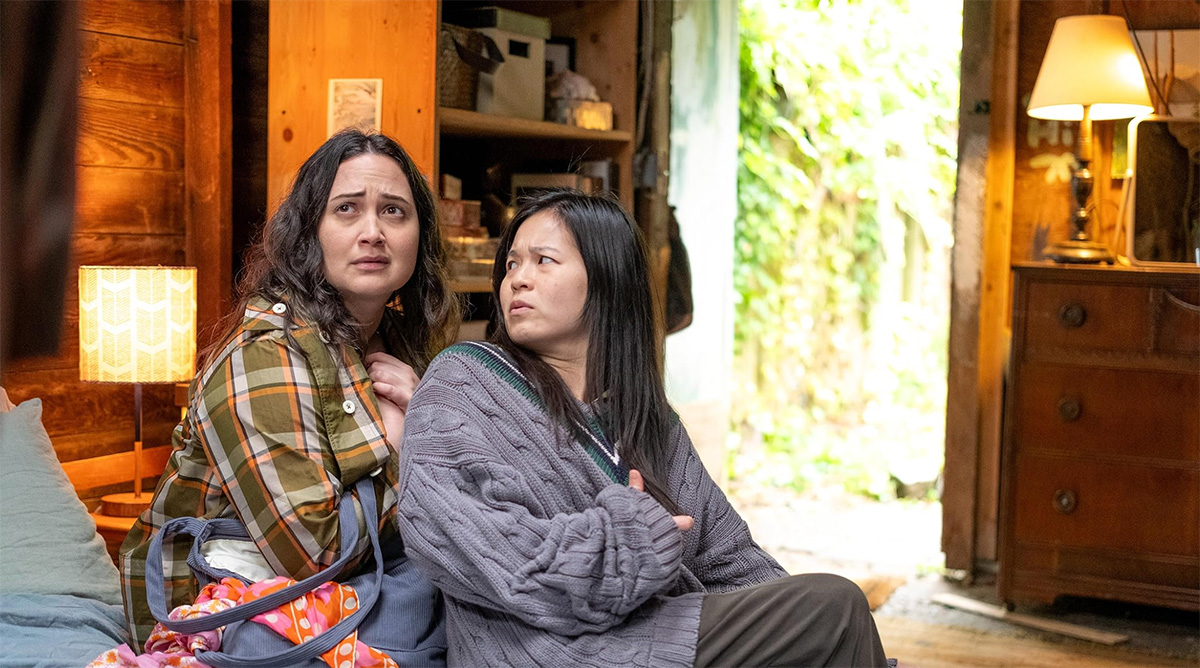
Creating a worthy remake can be a tricky proposition, especially when the movie being remade is a beloved classic – but that doesn’t mean it’s an impossible one.
Consider Andrew Ahn’s new version of 1993’s “The Wedding Banquet,” a film that put future “Brokeback Mountain” director Ang Lee on the proverbial map in America, which opens in theaters this weekend after a debut at Sundance earlier this year. The original, an American/Taiwanese production which became a surprise hit in the U.S., broke ground with its story — a culture-clash comedy of manners about a queer romantic triangle attempting to stage a sham wedding, it was quickly embraced by LGBTQ audiences thrilled to see representation on the big screen – and positive representation, at that – in an era when it was even scarcer than it is today. To undertake a remake of such a film is a bold move, to say the least.
Yet gay Korean American writer/director Ahn (“Spa Night,” “Fire Island”) has built his blossoming career on films about queer relationships among Asian American characters, with as much (or more) emphasis on family, both biological and chosen, as on romantic partnership; It seems natural, perhaps, for him to reinterpret this influential classic through his own lens, and he’s already proven himself as a filmmaker whose strengths line up perfectly with the material.
Even so, Ahn hedges his bets, perhaps, by collaborating on the new screenplay with James Schamus, who also co-wrote the original (along with Lee and Neil Peng), and the result is a movie that – although it recrafts the original romcom for a newer age and reconfigures its central relationships a bit to “up the ante” on its complications – stays relatively faithful to the broad strokes of its plot.
In this iteration, the New York setting is transposed to Seattle, and the plot revolves around not just one queer romance, but two: Chris and Min (Bowen Yang and Han Gi-Chan), a stalled grad student and his South Korean boyfriend, and their lesbian friends-and-landladies Lee and Angela (Lily Gladstone and Kelly Marie Tran), who are struggling to become parents through expensive IVF treatments. Min, an artist whose temporary visa is about to expire, wants to stay with Chris and build a life in America, but his grandmother (Youn Yuh-jung) – currently running the vast family business empire to which he is heir – wants him to come home and claim his place in the organization. A wedding to Chris would secure him the green card he needs to defy his grandmother’s demands, but it would also mean outing himself as gay and potentially being cut off from his inheritance. As a solution, he offers to pay for Lee and Angela’s fertilization procedure in exchange for a “green card wedding” with the latter, ensuring that he can remain in the U.S. while also remaining in the closet to his family.
Of course it’s an idea as bad as it sounds, but despite some reticence, the couples agree to the plan; but when Grandmother decides to come to America and meet the bride in person, the four of them must attempt to pull off a masquerade that escalates far beyond their expectations after she insists on putting on a traditional – and elaborate – Korean wedding worthy of her grandson’s exalted status, all while wrestling with the ambivalence and doubts that begin to encroach on their relationships as the scheme begins to fray at the edges.
Those who’ve seen the original already know that things don’t play out exactly as planned – and anyone who hasn’t won’t be surprised when it doesn’t, anyway. We already told you it was a bad idea.
That, of course, is the charm of the romcom, a genre in which mishaps, crossed wires and conflicts are all part of the fun, and in any case it gives Ahn’s film the opportunity to explore – as Lee did with the original – the more serious and relatable challenges of reconciling our queerness with the deeply ingrained traditions of our cultural backgrounds; he does so with gentle wit and an equal measure of respect, but he’s not above getting laughs by pointing up the sheer absurdity that sometimes goes along with the process. Neither does he hesitate to delve into the messiness of queer relationships, even (and perhaps especially) with lifelong friends, or the deep insecurities and self-criticisms which get in the way of sorting them out.
To these ends, “Wedding Banquet” relies heavily on its cast, who embrace and clearly relish the chance to flesh out these characters. Yang brings his inevitable “SNL” star power to the table but downplays the wackiness in favor of a more nuanced tone, and Gi-Chan shines as his pragmatically idealistic partner; Gladstone’s intelligence and authenticity is a grounding force, while Tran counterpoints her with an eminently likable turn as her spunky-but-anxious misfit of a girlfriend – and the resonance they each bring to the prospect of motherhood highlights the longing for family and legacy that so many queer couples carry as they build their lives together.
It’s not all about the couples, though. Veteran Chinese American actress Joan Chen (“Tai Pan,” “Twin Peaks”) is a scene stealer as Angela’s hyper-supportive mom, whose participation in her daughter’s “lavender wedding” requires her to go against her deepest instincts as a proud ally, and Bobo Le provides a further connection to the theme of family with a charming performance as Yang’s tomboy-ish little sister. The anchoring performance, however, comes from acclaimed Korean star Yuh-jong, whose shrewd, savvy, and staunch portrayal of Gi-Chan’s power-player grandma adds a much-needed dose of level-headed wisdom into the midst of the whirlwind.
In the end, Ahn’s update of Lee’s classic comedy scores big points for honoring the original’s message of acceptance and embracing the notion of reimagining our traditional ideas about family structure to meet the needs of an ever-changing world; it also succeeds in maintaining a heartfelt sense of empathy for each of its characters, all of whom appeal to us precisely because of their imperfections and their hangups. None of them are perfect, but all of them are perfectly human, which goes a long way toward making Ahn’s remake feel like more than just the slickly-made feel-good romcom it resembles.
And yet, given the screwball potential and the endless possibilities for farcical developments in the convoluted deception attempted by its sets of lovers, Ahn’s “Wedding Banquet” could have been funnier. Leaning into an idealized and sentimental perspective as it gracefully brings its characters’ lives into place, it occasionally feels a bit “precious,” too “Hollywood” to be believed.
Again, however, this is part of the charm of the romcom: if generations of straight audiences have gotten the chance to buy into idealized big screen fantasies about life and love, then why shouldn’t we enjoy the same privilege?
With that in mind, “The Wedding Banquet” makes for a perfect opportunity to entertain and validate ourselves – and even if it doesn’t tickle your funny bone, it’s a generous enough feast for your queer soul that it deserves you to see it.
Just make sure you bring somebody special to share your popcorn with.
Movies
An ‘Indian Boy’ challenges family tradition in sweet romcom
Refreshing look at what is possible when a family is willing to make changes

For queer audiences hungry for representation, nothing says “I feel seen” quite as much as a good queer romcom.
Perhaps it’s because love stories are universal, differing from culture to culture in the surface details only, and therefore have the potential for helping straight audiences understand a different kind of love a little better; or perhaps, in seeing our kind of love displayed so publicly, we feel a sense of validation. Whatever the reason, it rings our bell.
Maybe that’s why the quest for the first “great gay romcom” has continued to be a driving factor in the ongoing history of queer cinema, setting up an expectation in the mainstream that has, perhaps inevitably, fallen short of creating it. Fortunately, there are some efforts that have risen above the pressure to simply be what they are, instead of being the answer to everybody’s prayers for acceptance, and in so doing have managed to come close.
“A Nice Indian Boy” is just that kind of movie. Adapted from a play by Madhuri Sheka (by Eric Randall, whose screenplay made Hollywood’s buzzy “Black List” of un-produced scripts in 2021) and directed by Canadian-born Indian filmmaker Roshan Sethi, it might come closer to presenting an entirely successful gay romcom than most of the other overthought efforts that have come before.
It centers on Naveen (Karan Soni), a 30-something gay doctor, whose South Asian Indian family has long since accepted and supported his orientation but still struggles to reconcile it with their traditional beliefs. Enter Jay (Jonathan Groff), a white freelance photographer who grew up as an adoptee to Indian parents, and of course it’s love at first sight. A whirlwind courtship leads to a proposal, but there are a lot of considerations that must be met before the smitten couple can achieve the “big Indian wedding” of their dreams. The one that looms largest is gaining the approval of Naveen’s progressive-but-devout Hindu parents (Harish Patel and Zarna Garg) – not to mention his discontented sister (Sunita Mani) – whose confusion over his new fiancé’s ethnicity is just one of many obstacles they face in making their dream nuptials a reality. Intensifying that challenge – frequently to comedic effect – is Naveen’s struggle with his own insecurities, which threaten to derail not only the wedding plans but his relationship with the emotionally open and unreservedly passionate Jay, too.
It’s a sweet and clearly heartfelt affair, with a few laugh-out-loud moments to be found, as well as the wry introspection of its neurotic lead character, whose self-questioning turmoils feel like a connecting thread to the work of Woody Allen – indeed, “Annie Hall” is even name-dropped in the film, suggesting a spirit of homage that can be traced in a reflection of that classic Oscar-winner’s title character through Jay’s quirkily unconventional personality.
At the same time, the movie marries its diverse cultural influences by drawing just as heavily from a love of “Bollywood” cinema, and one of its movies in particular, which both of its protagonists adore. That allows it to maintain an aura of lush, larger-than-life romanticism that counterpoints the amusingly endearing self-deprecation of its main protagonist; it also reflects in the movie’s colorful, lively visual aesthetic and its choice to share focus on an entire family of characters for a more sweeping perspective.
As for its handling of the subject of race, despite its clear (and queer) twist on the “Guess Who’s Coming to Dinner?” trope of a family’s surprise over a bi-ethnic romance in its midst, “Indian Boy” doesn’t spend much time worrying about a love connection shared across racial divides; and while it gets considerable comic mileage out of Naveen’s parents’ well-intentioned but clueless efforts to show their acceptance of their gay son, the queerness of his relationship is not really an issue in itself. Rather, the conflict comes – for all of the movie’s primary characters, not just for the couple in the middle – from the difficulty of finding harmony between old customs and a new world that no longer fits within their boundaries.
Admittedly, Sethi’s movie sometimes feels a little too sentimental to be believed; it paints an aspirational picture – a true-love romance between a successful doctor and a rising artist – and tugs even harder on our heartstrings with its depictions of clumsy-but-sincere acceptance from the family around them; and while we don’t want to spoil any surprises, when it comes time for the big finale, it pulls out all the feel-good stops. Cynics in the audience might fail to be as enchanted as it wants them to be.
And yet, it all works wonderfully, largely because of its cast. Soni and Groff have an instantly tangible chemistry, and their differing personalities complement each other perfectly. Individually, they take us with them on their personal journeys with just as much clarity and conviction, and the movie would fall flat without the strength of their performances at its core.
Equally superb, however, are Patel and Garg, whose discomfort over the preparations for their son’s wedding never feel like they come from anywhere but love and a desire to share in his happiness; and Suri, whose considerable comedic talents contrast to great effect with the brewing discord within her character, lends a much-needed weight to the mix while still managing to glow alongside all her costars.
Combined with the sharp, funny, and insightful script and the generosity of Sethi’s directorial approach, which frames each character with respect and import to the story, it all makes “A Nice Indian Boy” a nice crowd-pleasing movie to see. It may or may not be “the great gay romcom,” and it might all seem a bit too glossy and perfect for some viewers’ taste – but it offers a refreshing look at what is possible when a family is willing to make changes in their way of life simply for the sake of love. What message could be more positive than that?
“A Nice Indian Boy” is now playing in theaters.
-

 Federal Government3 days ago
Federal Government3 days agoHHS to retire 988 crisis lifeline for LGBTQ youth
-

 Opinions3 days ago
Opinions3 days agoDavid Hogg’s arrogant, self-indulgent stunt
-

 District of Columbia3 days ago
District of Columbia3 days agoD.C. police seek help in identifying suspect in anti-gay threats case
-

 Virginia3 days ago
Virginia3 days agoGay talk show host wins GOP nom for Va. lieutenant guv

